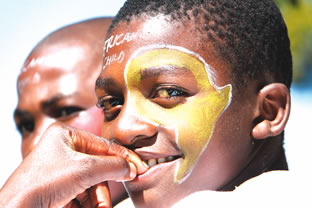‘Make us run with the hares’
error however golden, was bound to come to an end sooner or later, as the sun has now set on minority groups in Zimbabwe?
Yes, this pen contains that, instead of throwing in their lot with the Smith regime which oppressed blacks, the Asians and coloureds especially should have dug in their hills alongside the black majority who brought the freedom they enjoy today long after the demise of the whites on the sides of whose side they stood were counted during the golden era of white minority rule.
So, in fairness to truth the minority communities should cry foul not against the Indigenisation and Empowerment Act that now seeks to give blacks a new lease of life with a huge stake in the economic affairs of the motherland.
These people should instead openly kick themselves for burying their heads in the sand, at least a majority of them, when Africans in this country ran the gauntlet of mosquitoes, snakes, and capricious, and sometimes unfriendly weather conditions in the bush waging war. Why are minority groups now complain of exclusion enjoyed blissful nights under casey blankets with their wives secure in the belief that General
Peter Walls and his trigger happy Rhodesian soldiers would protect them and their businesses by killing or warding off “terrorists”, as they and the whites pejoratively described freedom fighters who brought them and everyone else the peace now prevailing in the country.
And why, why, indeed, have they waited passively this long as they knew deep down in their hearts that they belong in Zimbabwe instead of challenging the Citizenship law which, they say, categorises them as “aliens” with anomalous status reflected on their identity documents?
Surely, one is to be forgiven for surmising that as long as they could declare: “Lo money yena kathina, locountry yena kawena” they found no credible reason to protest their legal exclusion while even knowing that they are as indigenous as their black compatriots?
Some of them say their businesses are under threat by black Zimbabwean seeking a stake from them and pursuit of the black empowerment law that compels indeginous people to have majority shareholding stake in foreign — owned companies.
Has that “threat” acted or not acted as a wake up call to those affected to claim their rightful place along indeginous blacks in this beautiful country? Only they have the right answer to this question.
Admittedly, some minority groups, particularly those of Asian origins, did openly support the struggle for independence in this country, especially in the sixties and latterly, while the cousins of the whites apparently found it convenient to be counted more with the foreign ruling culture in spite of the black blood also calculating in them.
Nevertheless, the timing of the complaints about discrimination, thirty one years of late, even blatant threat to take the government to court over “grey areas” in the Indigenisation Act, are tantamount to forcing the state to change things in favour of the minority communities at gun point, and leaves a foul test in the mouth.
Genuine as their grievances are made to appear, the minority groups would even at this late hour be applauded for taking the initiative to have any wrongs in both the Indigenisation Act and Citizenship Act put right by the powers that be and peacefully, instead of wanting things done under duress, as implied reference to seeking recourse to the courts by Harare lawyer Abolullah Kassim.
As for the claim by a certain member of minority communities that they “never took part” in exploitation of other Zimbabweans”, should people dismiss it with the contempt it deserves because some members of minority groups labelled the “greed of Rhodesians and those of Rhodesian mentality”.
And yet those who have demonstrated their support of government’s empowerment efforts for blacks in both words and deeds deserve a slap of appreciation on the shoulder. But let it also be said with equanimity that the apology to the minority communities for any “omission” made in the Indigenisation campaign is not a sign of weakness on part of the government but, rather, one of strength in acknowledging a mistake and making a commitment to put it right.
Only the weak tend to cover up mistakes by blaming others or circumstances as a way of protecting their image.
This also means that the strong and beautiful ones among the minority groups in the country should at one for their own omissions which left them in the invidious situation whereby they have to scramble reasons for inclusion as party of the indigenous Zimbabwean community, of which they indeed are by virtue of their birth right so that their skin colour becomes inconsequential in the circumstances.
The beauty about Zimbabwe is that it is still not too late for those who yesterday hunted with the hounds to now run with the hares who survived the brutal hunts.
The pen – “mightier than the sword” has spoken for those with ears to hear and act with grace.











Comments